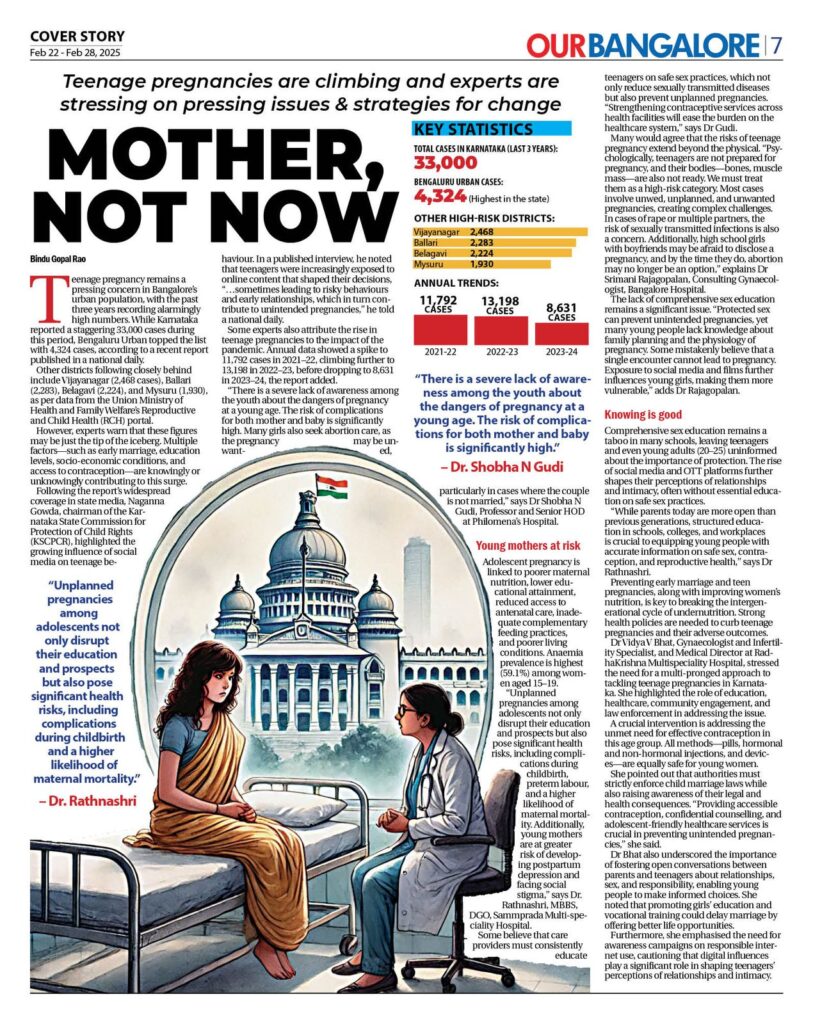
Several factors contribute to the increasing number of teenage pregnancies in Karnataka and Bengaluru:
- Child Marriages: Despite being illegal, child marriages persist in various communities, leading to early pregnancies.
- Socioeconomic Challenges: Economic hardships and limited access to education often push families to marry off their daughters at a young age.
- Lack of Comprehensive Sex Education: Many adolescents lack proper education on sexual and reproductive health, leading to uninformed decisions and unintended pregnancies.
- Influence of Social Media and Internet Access: Exposure to inappropriate content online can influence teenagers’ behaviour, leading to early sexual activity without adequate understanding of the consequences.
- Family Instability: Unstable family environments may contribute to adolescents engaging in early relationships as a coping mechanism, increasing the risk of teenage pregnancies.
In response to this issue, the Karnataka government plans to expand awareness programs in the 2025-26 academic year, collaborating with NGOs and the Karnataka State Commission for Protection of Child Rights to educate adolescents and promote preventive measures. Schools should implement age-appropriate, scientifically accurate sex education to teach teenagers about reproductive health, contraception, and the consequences of early pregnancy.
Prevention Strategies – Key measures include:
- Comprehensive Sex Education
- Strict Enforcement of Child Marriage Laws
- Improved Access to Contraceptives & Healthcare
- Parental and Community Involvement
- Economic and Educational Empowerment
- Regulating social media & Online Content
Risks of Teenage Pregnancies
Teenage pregnancies pose serious health, social, and economic risks:
- Higher Maternal and Infant Mortality – Teenage mothers are more likely to experience complications such as eclampsia, infections, and postpartum hemorrhage.
- Increased Risk of Preterm Birth & Low Birth Weight – Babies born to teenage mothers often suffer from developmental issues due to inadequate prenatal care.
- Higher Risk of Anemia & Malnutrition – Teenage bodies are still developing, making it harder to support a pregnancy without facing nutritional deficiencies.
- Greater Likelihood of Pregnancy-Induced Hypertension – Young mothers have a higher chance of developing high blood pressure and related complications.
- Psychological & Social Risks
- Emotional & Mental Health Issues – Teenage mothers often face stress, anxiety, and postpartum depression due to a lack of emotional preparedness.
- School Dropout & Limited Career Opportunities – Many teenage mothers are forced to quit school, limiting their education and job prospects.
- Stigma & Social Isolation – Societal judgment and family pressure can lead to isolation and lack of support.
- Financial Instability – Most teenage mothers depend on family support or struggle financially, increasing the risk of poverty.
Long-Term Impact
- Higher Risk of Future Unintended Pregnancies – Teenage mothers are at a higher risk of repeat pregnancies if they lack access to contraception and proper guidance.
- Intergenerational Cycle of Poverty & Poor Health – Babies born to teenage mothers may face developmental challenges, continuing the cycle of poor health and economic instability.
- Preventing teenage pregnancies through education, healthcare access, and community support is crucial to ensuring a healthier future for young girls and their children.
Read the full story that first appeared in Our Bangalore dated Feb 22-28, 2025 here:


Leave a Reply